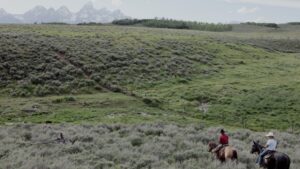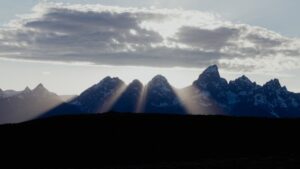Elk, bison, bears, oh my!
Under a chrome-colored sky ribboned by rainclouds, local outfitter Jake Hutton led a horseback tour of the Kelly Parcel, telling stories all the while.
“I got charged by a grizzly bear right here last spring,” said Hutton. “She came barreling out of the trees and bluff charged for a second, stopped at 50 yards, stood up and growled, and then made up her mind and took off right after me again.”
Hutton leads these tours as his business, giving tourists a glimpse of the Wyoming landscape on horseback.
Sagebrush, larkspur, and wild roses simmered under hoof in the humid, late-afternoon heat. But these tours could go away.
Wyoming is constitutionally obligated to raise money for public schools from state trust lands like the Kelly Parcel, whether it be through managing them or selling them off.
Due to its proximity to public lands, it’s not easy for the state to make money off of the parcel through management. It pays the state only about $2,800 annually.
That constitutes a threat to the parcel since it would be prized real estate for developers if it were ever put up for auction on the open market.
Last year, the State Board of Land Commissioners made headlines when it proposed doing exactly that.
Wyomingites across the state fervently opposed that idea, and in response to the public outcry, the Legislature passed a deal to conserve the Kelly Parcel by selling it to Grand Teton National Park for $100 million.
The sale has inspired strong opinions all around, including from outfitter Hutton.
“$100 million is a lot of money, but also in the big world of politics and big budgets, $100 million is gonna go away pretty quick, and they’re [the state] never going to get [the land] back,” he said.

Hutton and Anne McIntosh, a realtor visiting from Virginia, guide their horses past a spring on the Kelly Parcel. (Reed Mattison / REED MATTISON)
The deal and its caveats
Grand Teton National Park Foundation has two years to raise $38 million for the land transfer. The federal government will kick in the rest of the cash.
“This is a heavy lift for us to raise $38 million, basically, from early winter until hopefully sometime during calendar year 24, would be our hope,” said Leslie Mattson, the foundation’s president.
It’s the largest figure the foundation has ever had to raise, and in a remarkably short amount of time.
While Mattson said that she and the foundation are cautiously optimistic they’ll find the funds in time, the nail-biting isn’t nearly over.
“People say, ‘Well, congratulations. You got it done,’” she said. “I’m like, ‘No, we didn’t get it done yet.’”
In general, an obstacle to closing out the sale is a deep-seated distrust of the federal government in the Cowboy State.
“Over time, we have seen that land transfers between the state of Wyoming and the federal government have become more complicated,” said Jared Baecker, a conservation director at the nonprofit Greater Yellowstone Coalition.
Another wrinkle lies in the fine print that passed the Legislature.
Lawmakers added a line tying the fate of the deal to the federal Bureau of Land Management (BLM).
If the sale is to happen, the agency can’t choose the conservation-focused management plan ‘B’ for the Rock Springs area.
That plan limits a substantial amount of potential energy development, as well as closing roughly .02 percent of livestock grazing.
If the BLM does select ‘alternative B,’ it could squash the purchase altogether.
The agency is expected to come out with a final plan for Rock Springs by late July or early August.
But if the BLM does what the Legislature wants in southwest Wyoming, the Kelly Parcel deal would eventually go before the Board of Land Commissioners for a final vote of approval.
But even there, another challenge is looming: a working group formed by the board is exploring a different variation of the Legislature’s deal.
“I favor looking at a [land] exchange with the federal government,” said Megan Degenfelder, Wyoming’s superintendent of public instruction and one of five members on the board. “We cannot allow the federal government to get a sweetheart deal on the backs of Wyoming students, which these state lands fund.”
Degenfelder’s preference is for the state to buy or swap land owned by the feds in Wyoming that has oil and gas resources or mineral wealth, in exchange for the Kelly Parcel.
“I think in the fall of this year, we’re going to see multiple options come before the board, and I hope that this is one of them,” Degenfelder said.
Degenfelder said she’ll vote against the Legislature’s straight-up sale if it ever winds up before the board.
It would only take two more votes to kill it.
Even if adding on another condition to the transfer makes the feds walk away entirely, Degenfelder said in her opinion, it’s a risk worth taking.
“We have to do what’s best for Wyoming, I will always, always do what’s best for Wyoming rather than the federal government,” she said.
Of course, if neither iteration of the deal succeeds, the parcel could wind up right back where this all began, with the board putting it up for auction.
Home, home on the range
Greater Yellowstone Coalition’s Jared Baecker said that if the parcel ended up in the hands of private developers, it would “absolutely fragment and hinder some of the greatest migrations of hoofed mammals in the lower 48 states.”
He and others point to the unique geography of the parcel and the mountains surrounding it.
“Physically, the landscape is a bottleneck; it’s a choke point between two mountain ranges,” Hutton said. “It also serves as a migration path for mule deer in the Sublette mule deer herd and lies along the path of the pronghorn.”
Back at the Kelly Parcel, the sun set behind the Tetons, which jut up from the earth like the jawbone of some ancient beast.
Outfitter Jake Hutton stopped the group to take a moment to look at the mountains.
“I’m pretty convinced this is the best view in Wyoming right here,” he said.
You can learn more about updates on the Kelly Parcel in last week’s episode of Jackson Unpacked, available on Spotify or wherever you get your podcasts.
This reporting was made possible by a grant from the Corporation For Public Broadcasting, supporting state government coverage in the state. Wyoming Public Media and Jackson Hole Community Radio are partnering to cover state issues both on air and online.






